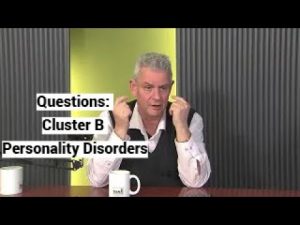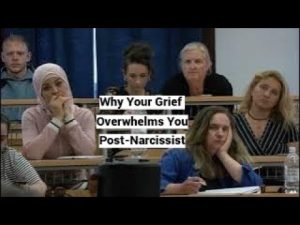- 1 Introduction & Participants
- 2 Concept of Malignant Self-Love
- 3 Emotional Experience of Narcissists
- 4 Coping Strategies by Partners of Narcissists
- 5 Narcissistic Recognition and Relationships
- 6 Narcissistic Internal Dynamics
- 7 Origin & Genetic Predisposition to Narcissism
- 8 Narcissistic Baits and Manipulation Techniques
- 9 Differences between Narcissists, Psychopaths, and Sociopaths
- 10 Borderline Personality and Narcissistic Relationships
- 11 Impact of Enmeshment with Mother on Narcissism
- 12 Empaths and Narcissism
- 13 Effects of the COVID-19 Pandemic on Narcissism
- 14 Final Thoughts & Future Topics
Introduction & Participants
- The meeting involved Sam Vaknin, author and professor known for pioneering work on narcissistic personality disorder (NPD), and Lydia Rangalowska, CEO of Narcissist Publications and editor of Vaknin’s book. They discussed topics related to narcissism, narcissistic abuse, and personality disorders. [00:00]
Concept of Malignant Self-Love
- Malignant self-love refers to a self-love that becomes embittered, resentful, and eventually self-loathing when disappointed, similar to the transition from love to loathing in relationships. Narcissism is described as a malignant form of self-love that metastasizes into self-loathing. [17:30]
Emotional Experience of Narcissists
- Narcissists lack access to positive emotions like love or joy but experience intense negative emotions such as hate and envy. Narcissistic elation is not true joy but self-affirmation based on grandiose fantasies. Narcissists’ emotional life is dominated by negative emotions. [23:00]
Coping Strategies by Partners of Narcissists
- Lydia explained that partners of narcissists create their own emotional space with positive emotions to protect themselves from the narcissist’s negativity. Maintaining healthy boundaries is essential to avoid becoming like the narcissist or depressed. Partners must also accept that narcissists often do not acknowledge or credit them. [31:00]
Narcissistic Recognition and Relationships
- Narcissists do not recognize others as separate individuals but as internal objects they control. They do not say “thank you” because they relate to what they get, not to the giver. Victims often struggle to accept that they do not exist in the narcissist’s external reality and are interchangeable providers of “four S’s”: sex, services, supply, and stability. [41:00]
Narcissistic Internal Dynamics
- Narcissists interact with internalized “introjects” and must constantly rewrite these mental representations to reduce dissonance and anxiety. This process is energy depleting and demanding, causing narcissists to require constant narcissistic supply to maintain mental balance. [50:00]
Origin & Genetic Predisposition to Narcissism
- Narcissism is partly genetic but requires environmental factors such as childhood trauma to manifest. Not everyone exposed to negative parenting becomes narcissistic; predisposition interacts with environment. Differences between covert and overt narcissists reflect phases, not distinct categories. [1:20:00]
Narcissistic Baits and Manipulation Techniques
- Narcissists lure victims using four main “baits”: presenting themselves as a child to elicit maternal instincts, shared victimhood, fantasy worlds that replace reality, and drama as a form of stimulation. These tactics create addiction and dependency in victims. [1:00:00]
Differences between Narcissists, Psychopaths, and Sociopaths
- Psychopath and sociopath are essentially the same; psychopathy represents an extreme form of antisocial personality disorder. Narcissism, psychopathy, and borderline traits can overlap and morph depending on circumstances. Psychopaths are loners and grounded in reality, unlike narcissists who rely on others for supply. [1:40:00]
Borderline Personality and Narcissistic Relationships
- Borderlines seek out narcissists because narcissists provide a narrow “goldilocks zone” for intimacy and external validation without engulfment anxiety. Narcissists’ lack of true intimacy and their grandiosity offer borderlines a sense of safety and self-love through narcissistic gaze, creating strong addiction. [1:50:00]
Impact of Enmeshment with Mother on Narcissism
- All narcissists are enmeshed with their mothers psychologically, meaning they did not separate individuate during key developmental windows. This emotional incest prevents individuation and leaves the mother represented as a controlling internal introject, influencing adult behavior and relational patterns. [1:35:00]
Empaths and Narcissism
- The concept of “empaths” as people with heightened empathy is criticized as unsupported by research; many self-identified empaths may actually exhibit narcissistic traits such as self-aggrandizement and splitting. True empathy is universally present and distributed normally across people. [2:10:00]
Effects of the COVID-19 Pandemic on Narcissism
- The pandemic and related social stresses increased narcissistic traits in populations due to widespread feelings of helplessness, mistrust in institutions, and retreat to compensatory fantasies of omnipotence and control. [2:15:00]
Final Thoughts & Future Topics
- Closing remarks emphasized the complex, fluid nature of personality disorders, the importance of understanding narcissistic abuse without taking it personally, and potential for future discussion on broader societal impacts, forgiveness, and positive lessons from these dynamics. [2:20:00]
Note: Timestamps approximately represent where topics are first introduced or extensively discussed in the transcript.






